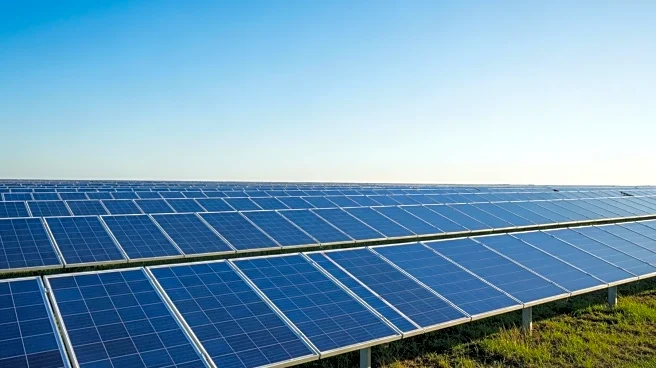What's Happening?
Inox Solar has commenced production at its new solar module manufacturing facility in Bavla, Ahmedabad, Gujarat. The plant, with an initial capacity of 1.2 GW, is part of a larger 3 GW project aimed at advancing solar technology and supporting India's sustainability goals. The facility utilizes cutting-edge technology to produce high-efficiency N-type TOPCon modules, which offer lower degradation and increased reliability for modern solar installations. This development aligns with India's ambition for self-reliance in power generation and represents a significant milestone in the country's renewable energy sector.
Why It's Important?
The launch of Inox Solar's manufacturing plant is crucial for India's renewable energy landscape, as it enhances the country's capacity to produce advanced solar modules domestically. This move supports India's goals of achieving energy independence and reducing reliance on fossil fuels. By expanding its production capabilities, Inox Solar contributes to the growth of the solar industry, potentially leading to job creation and economic development. The increased availability of high-efficiency solar modules may also accelerate the adoption of solar energy across various sectors, promoting environmental sustainability.
What's Next?
Inox Solar plans to continue expanding its production capacity, with the full 3 GW plant expected to be operational in the near future. The company aims to leverage its advanced technology to meet growing demand for solar energy solutions. As India pursues its renewable energy targets, further investments in solar infrastructure and technology are anticipated. The government's support for clean energy initiatives may drive additional projects and collaborations within the industry, fostering innovation and progress towards a sustainable energy future.
Beyond the Headlines
The expansion of solar module production raises questions about the environmental impact of manufacturing processes and the sustainability of materials used. As the industry grows, there is a need to address potential challenges related to waste management and resource utilization. Additionally, the shift towards renewable energy may influence cultural perceptions of energy consumption and encourage broader adoption of sustainable practices. The development of domestic solar manufacturing capabilities also highlights the importance of technological innovation in achieving energy security and environmental goals.










